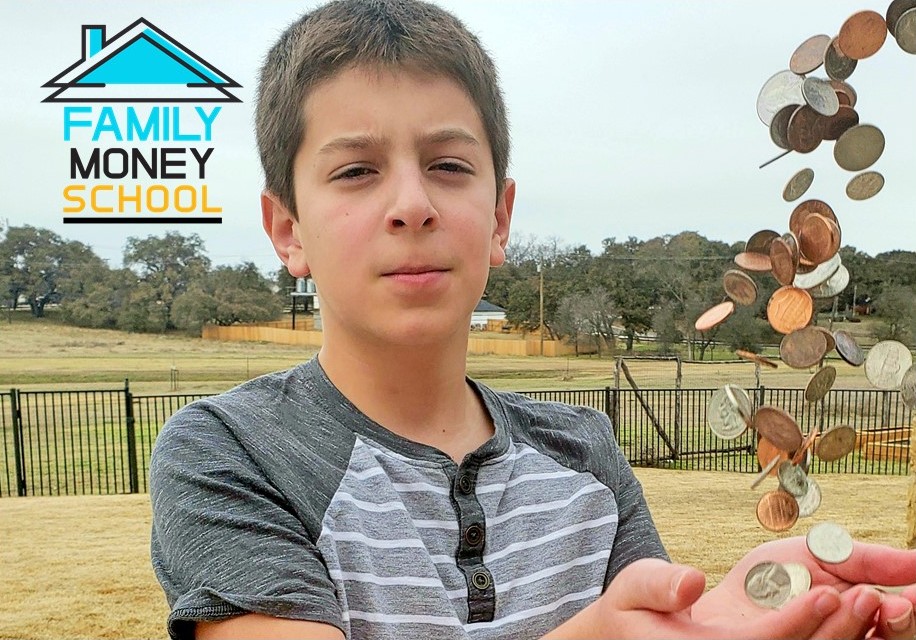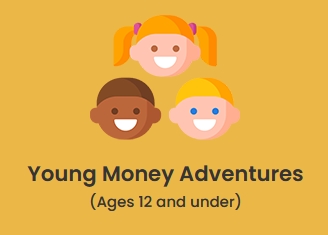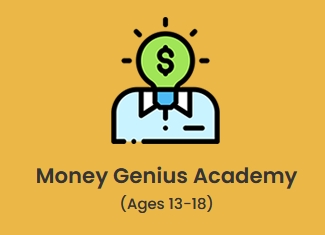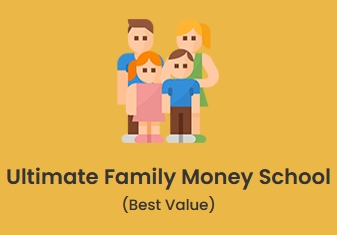Notice: My boys and I were given access to the Family Money School courses in exchange for our honest review.
Family Money School Quick Info
Fami
Homeschooling for Financial Freedom
Homeschooling is all about educational freedom and independence. Personal responsibility is key to maintaining our freedom. Family Money School was designed with this in mind. Because living a life in debt is living without freedom. To be beholden to who you owe and who is giving the handouts.
So why would any money lending company or government institution (i.e., public school) find it in their best interest to teach kids to be financially independent?
In this uncertain and financially reckless world we need to arm our kids with sound money management skills to be free from financial coercion. Therefore, we must not neglect teaching our kids the tools to become financially free.
And we need to start earlier than you think!
Grounding Our Kids’ Financial Fantasies
I’m a realist, so I jumped at the chance to review Family Money School as a possible tool to keep my kids’ future financial fantasies in check.
Because when my 12-year-old grows up he wants to be rich. He’s not sure how to make that happen yet, and though his Scrooge-like tendencies are promising, his financial plans are more fantasy than fruitful at this point. We simply want our kids to be happy, free, and financially secure. But if he can afford his elderly parents a cottage behind his sports car showroom and pecan orchard, that’d be nice too.
My oldest boys want to be an airline pilot and a computer hack..errr…engineer, respectively. Both are doable but pricey endeavors. We want to help them make it happen with as little student loan debt trailing them as possible.
We can’t tell our kids they can be anything they want to be in life and then neglect pointing out the price tag of their goals, the cost of living in the world today, and the pitfalls and schemes waiting to trip them up.
We must step in and teach responsible money management skills. Because if we don’t, who will?
Who is Teaching Kids to Adult with Money?
Who is really teaching kids to adult with money these days? Who is teaching them to take personal responsibility and plan for their financial future? Look at the frivolous spending in congress, the average amount of debt per person in America, and the constant bombardment of advertising and credit card offers and you’ll quickly realize… no one. No one in these areas are teaching kids to wisely manage money.
Rather, kids are being taught by a consumer driven world. Everywhere they turn they are being taught not to worry just “Spend! Spend! Spend!” And then they are being taught to wait for handouts and bailouts.
Parents must step in with truth and wisdom.
But most parents don’t do much more than play store with their preschoolers or cutthroat board-flipping games of monopoly with their older kids, and then they complain and spout obvious wisecracks…
“Money doesn’t grow on trees.”
This snarky phrase is sometimes the only lesson in personal finance that kids get from their financially stressed parents. Right after their kid just asked for the latest impossible-to-find-or-afford game console, horse, or canary diamond for their birthday.
Sadly, this snark might be the only bit of financial knowledge many parents are able to pass on with certainty from their own shaky abilities at managing money.
Let’s face it, the government/economics classes many of us were taught by the high school football coach were far from thorough. School fundraisers, where you make your parents buy all the chocolate bars so you can win a glow-in-the-dark frisbee, were even less effective.
Parents must take the lead and step up their game. But how do we know what to teach them?
Family Money School
Family Money School is a financial education program that has unsure parents covered! Even teaching parents to adult with money as they follow along. Seriously, I’ve already learned some big girl spending and saving ideas I never considered, and we’ve just started the course!
Family Money School courses are based upon the 5 Pillars of Personal Finance:
- Working
- Spending
- Saving
- Giving
- Money Isn’t Everything
Matt Matheson, the creator of Family Money School, is a finance writer and teacher, and most importantly a father. He set out to protect his own kids from the money-sucking world and is sharing his knowledge through these engaging courses designed for kids and teens.
There are overloads of information in books and websites parents could spend weeks researching to try to put a course together on their own. Inevitably they would still leave something important out. What homeschool parent has time for that!?
With Family Money School the knowledge, skills, and hands-on activities have already been compiled into an effective fun unit study!
That’s right, homeschool moms, Family Money School makes a great unit study! And the hard work and planning have been done for you! For the full homeschool experience you could add interesting books, money themed movies, and make piggy bank shaped cookies. (click for more homeschool lingo!)
Now if it were up to me, I’d probably call it Family Money Homeschool, for obvious reasons. But also, because we as parents, regardless of whether we homeschool or not, have a vested interest in our kids’ ability to handle money wisely. We have more skin in the game.
After all, they get to pick out our retirement homes. And we want them to afford a good one! Or a nice little guest cottage attached to the boat house…. ahem.
So, we parents need to know what is in the courses and books we present to our kids.
Course Descriptions & Hifalutin Opinions
Description- Designed for kids 12 and under, this course is parent led. Parents watch the videos to obtain the knowledge and skills in each lesson, and then they are given specific techniques to present the info to their young children in a relaxed and active off-screen manor. The course includes printables, discussion prompts, and hands-on activities. Purchase includes lifetime access, so there is no pressure to finish in a certain time.
My Hifalutin Opinion- I particularly like that this is a family course and young kids are not expected to watch the videos. Kids don’t need any more screen time these days. This is truly a parent led course, so some parents might not like the need to prep beforehand. However, everything parents need to know is right there in the video making it a great resource for those who don’t know where to begin teaching money skills.
If carried out as planned, kids won’t even know they are doing “school”. They are just doing life and learning fun life skills at an age they can really make meaningful roots. Lessons could be discussed over dinner or while driving in the car. Many of the discussions will make kids feel they are being heard and activities engage them in adult-like behaviors, which will empower and challenge them to think responsibly.
Description- This is a self-directed course for teens age 13-18 that teaches personal finance and responsibility. Teens learn the value of work, conservative spending and saving practices including lessons on budgeting, credit, debt, investing, generosity, and gratitude. Students are guided through short and informative video lessons with printable note-taking pages, activities, challenges, and quizzes. Purchase includes lifetime access, so it can be used later with other children as they grow.
My Hifalutin Opinion- I like that this course is self-directed for independent teens but can also be done in a group setting for enjoyable and diverse discussions. Parents probably still need to be active in the course to ensure completion and to strengthen the importance of the subject matter.
I also respect the financially conservative nature of the lessons. Though this is a secular course, topics related to tithing and other religious views about money management could be added to discussions or activities. This course includes over 25 hours of instruction and activities. If supplemented with additional reading, video documentaries, essay writing or projects it could be recorded for credits on a high school transcript.
Description- This is a value course package which includes both courses, Young Money Adventures and Money Genius Academy. You get both courses in their entirety.
My Hifalutin Opinion- This option is good for parents teaching kids of multiple ages. Young Money Adventures does not go as deep into topics such as spending, credit, and debt topics that teens need to learn more about. Therefore, I believe having the teen course is ideal.
Also, the bundle is cost effective if you are teaching young kids now and plan to use the teen course as they grow. This is possible because your subscription never expires. However, parents who don’t mind doing some extra prep could purchase just the teen course, Money Genius Academy, and whittle it down for younger kids.
When to Start Preparing Kids for Financial Success
Duh… yesterday. But every day there’s a chance to get started teaching good money skills; things as simple as deciding to forgo the specialty coffee shop for a cup brewed at home to discussing career goals in relation to payable student loan debt.
We plan to have our boys complete Money Genius Academy this summer, but not call it summer school, instead maybe…. “The Allowance Project.” That should suck them in nicely.














